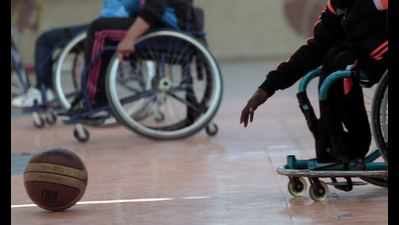- News
- City News
- chennai News
- People with disabilities score high with basketball
Trending
This story is from June 19, 2016
People with disabilities score high with basketball
There are few kinds of sporting disciplines that have given an identity to its players in the way wheelchair basketball has done to some. The game has given some people their lost confidence and has empowered people with disabilities and changed societal perception.

There are few kinds of sporting disciplines that have given an identity to its players in the way wheelchair basketball has done to some. The game has given some people their lost confidence and has empowered people with disabilities and changed societal perception.
Key Highlights
- Wheelchair basketball has helped in empowering people with disabilities and changing societal perception towards them.
- NGOs, government, sponsors are encouraging people with locomotive disabilities to take up the sport.
Chennai: Three years ago when W Arul Augustus lay on his hospital bed with an amputated left leg, following a freak accident, he was drained of all hope of living a full life and quite sure that he would never be able to pursue a sport. Now, with the 21-year-old being one of the probable players from Tamil Nadu at the qualifying tournament for the U23 Men's World Championship, in Canada next year, life has taken another turn for him, this time for the better.
There are few kinds of sporting disciplines that give identity to its players in the way wheelchair basketball does to some. Empowering people with disabilities and changing societal perception towards them, the game has given some people their lost confidence and others recognition and acceptance.
"Playing basketball has made me more positive. I don't see my condition as a disadvantage, rather I feel I have more opportunities now. Quotas for people like me ensure that I have a better chance of getting a job," says Arul, a third-year civil engineering student who was part of the Tamil Nadu team at the national Wheelchair Basketball Championships in Delhi last year.
City-based Madhavi Latha has been the consistent force behind promoting the sport in the country by establishing the Wheelchair Basketball Federation of India in 2014. She has roped in NGOs, government, sponsors and encouraged people with locomotive disabilities to take to the field. From the 20-odd players in the first coaching camp that she had organised two years ago, there are now more than 350 players across the country. "This sport not only helps to keep up fitness levels but also makes people independent, extrovert and more social," says Madhavi who is also a national-level para-swimming champion. Affected by polio as a child, Madhavi's tryst with sports started as rehabilitation but she went a step a further to put her weight behind more people taking up wheelchair basketball because it is a team sport unlike swimming.
The camp is the first-of-its-kind as coaches and referees from the International Wheelchair Basketball Federation (IWBF) and the International Paralympic Committee's AGITOS Foundation will be providing technical expertise. While this collaboration opens many doors, lack of awareness about the sport still persists. "The only special requirement is that we need sports wheelchairs to play the game," says Madhavi who adds that stadiums for training must be more disabled-friendly.
There are few kinds of sporting disciplines that give identity to its players in the way wheelchair basketball does to some. Empowering people with disabilities and changing societal perception towards them, the game has given some people their lost confidence and others recognition and acceptance.
"Playing basketball has made me more positive. I don't see my condition as a disadvantage, rather I feel I have more opportunities now. Quotas for people like me ensure that I have a better chance of getting a job," says Arul, a third-year civil engineering student who was part of the Tamil Nadu team at the national Wheelchair Basketball Championships in Delhi last year.
City-based Madhavi Latha has been the consistent force behind promoting the sport in the country by establishing the Wheelchair Basketball Federation of India in 2014. She has roped in NGOs, government, sponsors and encouraged people with locomotive disabilities to take to the field. From the 20-odd players in the first coaching camp that she had organised two years ago, there are now more than 350 players across the country. "This sport not only helps to keep up fitness levels but also makes people independent, extrovert and more social," says Madhavi who is also a national-level para-swimming champion. Affected by polio as a child, Madhavi's tryst with sports started as rehabilitation but she went a step a further to put her weight behind more people taking up wheelchair basketball because it is a team sport unlike swimming.
Till five years ago, 40-year-old Matilda Fonseka's home was her world. She had done her schooling privately, followed it up with a course in computer science but none of it ensured independence and a social life. "My mother was very protective of me as I was detected with polio when I was two. She thought that I would be safer at home. So I hardly had any friends and was left alone at home when my siblings joined college and went out with friends," says Fonseka, who is to participate in the national camp for wheelchair basketball in Hyderabad next week.
The camp is the first-of-its-kind as coaches and referees from the International Wheelchair Basketball Federation (IWBF) and the International Paralympic Committee's AGITOS Foundation will be providing technical expertise. While this collaboration opens many doors, lack of awareness about the sport still persists. "The only special requirement is that we need sports wheelchairs to play the game," says Madhavi who adds that stadiums for training must be more disabled-friendly.
End of Article
FOLLOW US ON SOCIAL MEDIA










